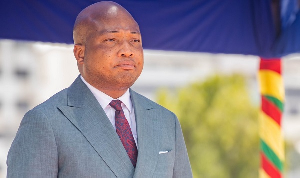Spencer Wan Blog of Thursday, 20 February 2025
Source: Eric Afatsao
How Can I Be Dismissed For Something I Said Before The Govt. Even Took Office–Wisdom Kwaku Deku
Wisdom Kwaku Deku, popularly known as Yayra Koku, has strongly denied allegations made by former National Entrepreneurship and Innovation Programme (NEIP) CEO, Kofi Ofosu Nkansah, regarding his dismissal from the National Identification Authority (NIA) in 2017.
Nkansah claimed that Koku was removed from his position due to misconduct, specifically for using social media to criticize President Nana Addo Dankwa Akufo-Addo and other government officials, a violation of public service regulations. However, Koku has dismissed these claims, arguing that his social media posts were made in 2016, before Akufo-Addo became President. "How can I be dismissed for something I said before the government even took office?" Koku questioned, highlighting what he views as an unfair decision.
Clarifying his employment history, Koku stated that he was recruited into the NIA under President John Agyekum Kufuor’s administration, emphasizing that his position was not a political appointment tied to the National Democratic Congress (NDC). He further revealed that he was dismissed without being given the opportunity to write a formal handover note, which he believes was politically motivated rather than a matter of professional misconduct. "I was not even allowed to complete a proper handover process. It was purely political," he asserted.
Fast forward to January 2025, under the administration of President John Dramani Mahama, Koku has now been appointed as the CEO of the NIA. His appointment has attracted public interest, with journalist Bridget Otoo pointing out the irony of his new leadership role at the same institution that once dismissed him.
Koku’s response has reignited discussions on political bias in public sector employment, questioning whether civil servants should face repercussions for political views expressed prior to a government transition. His case raises broader concerns about fairness, neutrality, and job security within state institutions when new administrations assume power.
As debates continue, Koku’s appointment symbolizes a shift in political dynamics, demonstrating how changes in government influence public sector leadership. His case serves as a reminder of the complexities surrounding political affiliations and employment stability in Ghana’s governance system.
Source; link
https://www.facebook.com/672097889/posts/pfbid0dbMhwGMEwpCkMjfMRhNueLyDxod6FRj1N1k4dhX72kgeES6NjZoYxZvpJ28s5a85l/














